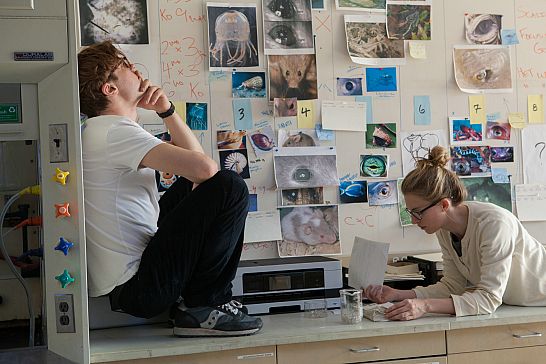 Michael Pitt
(Seven Psychopaths,
The Village) stars as Dr. Ian Gray, a New York-based molecular
biologist who specializes in the study of human eyes, something he has
been fascinated with his entire life, to the point where he has mapped
out the evolution of the eye through various species all the way up
through humankind. With the help of his new lab partner Karen
(Marling, The East),
he's set on developing a major breakthrough to prove that evolution,
and not God, is what's responsible for such a sophisticated organ, and
to do this, they set about a herculean task to find a species that is
blind but that has the ability to be genetically modified to develop
one, and perhaps evolve into a seeing species on its own.
Michael Pitt
(Seven Psychopaths,
The Village) stars as Dr. Ian Gray, a New York-based molecular
biologist who specializes in the study of human eyes, something he has
been fascinated with his entire life, to the point where he has mapped
out the evolution of the eye through various species all the way up
through humankind. With the help of his new lab partner Karen
(Marling, The East),
he's set on developing a major breakthrough to prove that evolution,
and not God, is what's responsible for such a sophisticated organ, and
to do this, they set about a herculean task to find a species that is
blind but that has the ability to be genetically modified to develop
one, and perhaps evolve into a seeing species on its own.
While this is going on, Ian's life takes an interesting turn when he
gets reacquainted with Sofi (Berges-Frisbey,
On Stranger Tides), a mysterious, free-spirited French woman
with beautifully exotic eyes that he met while she was still in
disguise at a chic Halloween party. It is around this time that
he begins to see strange patterns of numbers and symbols, and things
not readily explainable by a man of science. With Sofi's
spiritual beliefs always countering Ian's hard facts, the two form an
unlikely couple, but one that works. But when a tragedy occurs
that changes their relationship forever, Ian must confront what he
truly believes in.
I Origins is written and directed by Mike Cahill, who follows
up his intriguing indie Another Earth which he wrote with
I Origins co-star Brit Marling. His subject matter is
fairly engrossing, as well as some interesting plot developments and
huge ideas, but as a storyteller, Cahill does come up quite a bit
short on a number of occasions. For one, it seems ridiculous to
assume that some flaky scientist and his first-year lab assistant are
going to disprove the existence of God by genetically tampering with a
worm. There are far better examples of evolution that occur
naturally, and even if this proved anything, there is still the debate
of "intelligent design" that continues to exist as religion begins to
embrace the notion that life has evolved over many eons. Instead
of praise, Ian seems more likely to be criticized for tinkering with
nature in the worst scientific fashion.
For such huge ideas, Cahill gets the most out of a relatively low
budget, though it must be said that it does look like b-grade material, with less
emphasis on quality lighting and film stock. Still, it does
surprise from time to time in its design and camera work, so it isn't
exactly an eye-sore (no pun intended) by any measure, just dim and
drab on occasion.
The main problem with the film is the tendency to use shortcuts to
keep the plot moving along. In one instance, the scientists have
to fly up to Boise, Idaho to find the source of a mysterious picture a
young baby has responded to. The information they spend so much
money on to gather in person could have been done so easily in an hour
with a Google search and a phone call or email, but that just
wouldn't have been 'mystical'. The same could be said about a ridiculous search
in India to find the source of eyes Ian feels he has seen before.
Astonishgly, he almost immediately meets a woman who recognizes the eyes on sight. How this
woman is so astute as to remember eyes and the young girl who
possesses them but can't give any clue as to how the girl may be found
is one of the film's major contrivances just to try to prolong a
climax.
While Cahill's ambitious film falls short in too many important
narrative elements for me to give an outright recommendation, if
you're at all interested in the subject matter of past lives,
spiritual thinking, or the science vs. religion debate, you may still
find it quite worthwhile. If not, it's a film that certainly
intrigues, but ultimately Cahill's vision is too blurry for most other
viewers see much beyond its narrative obviousness.
-- There is an extra scene after the credits.

 Michael Pitt
(
Michael Pitt
(